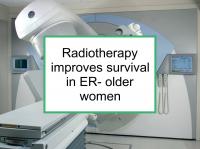Breast cancer in women over 70 has a different profile from breast cancer in middle age, tending to be less aggressive. Levels of estrogen receptor (ER) expression increase with advancing age, while proliferation markers decline. This pattern can lead to a tendency to reduce the level of treatment for old women with breast cancer.
In fact, the oldest women are not benefiting as much from improvements in breast cancer treatments as younger women. Suboptimal treatment has the potential to result in adverse outcomes even in women with less aggressive types of breast cancer such as hormone receptor positive (ER+/PR+) disease. In addition, aggressive disease such as triple negative (ER-/PR-/HER2-) breast cancer does still occur in old women. Now a new study has reported that women 70 and older with small ER- tumors experience better survival if radiotherapy is not omitted after lumpectomy.
As noted above, treatment of breast cancer in old women often varies from the standard of care. This makes sense for women who are too ill or frail to benefit from treatment. While most old women diagnosed with breast cancer will have surgery to remove the tumor if at all possible, radiotherapy is sometimes omitted and chemotherapy is often omitted. For the fortunate majority who have slow-growing tumors, such omissions might not reduce life span.
However, an otherwise healthy woman in her seventies can expect to live an additional 15 to 20 years. Such a woman who is diagnosed with aggressive breast cancer that could easily metastasize within three years might benefit greatly from appropriate radiation and chemotherapy, as would be offered to a middle aged woman.
Latest research finds old women with ER- BC benefit from radiation
The study referenced at the beginning of this news story was designed to investigate whether women at least 70 years of age with early stage ER- breast cancer benefit from radiotherapy after lumpectomy. Some previous studies have concluded that radiotherapy after lumpectomy does not extend lifespan in older women with early stage ER+ breast cancer. To conduct the study, the authors used Surveillance, Epidemiology, and End Results (SEER) data from the period 1998 to 2011. Patients at least 70 years who underwent breast conserving surgery for T1 (tumor ≤ 2 cm), ER- invasive ductal breast cancer were included. The women were divided into two groups consisting of 3,685 who received radiotherapy after surgery and 1,493 who did not. Those who underwent radiotherapy tended to be younger (median age 76 compared to 78 years in the non-radiotherapy group).
Women who underwent radiotherapy were found to have better overall survival (81.0% five-year survival) compared to those who did not (61.7%). This could be, in part, because the women who underwent radiotherapy were healthier and less frail overall than those who did not. However, breast cancer-specific survival was also higher among those who underwent radiotherapy (93.1% compared to 85.0% five-year cancer-free survival).
The authors conclude that women aged 70 and older treated with lumpectomy plus radiotherapy for small ER- breast tumors experience better outcomes compared to women treated with breast-conserving surgery alone. This information can help inform treatment decision-making for such patients, according to the authors.
Please see our article on breast cancer in old age for more information.
